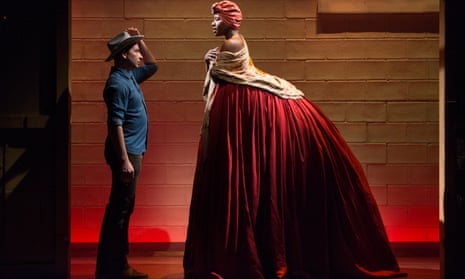As the UK’s so-called special relationship with the US becomes increasingly fraught, American history and politics are centre stage at this year’s Edinburgh festival. Alongside five shows with “Trump” in the title, from comedy to musicals, several fringe productions are interrogating troubling aspects of US culture.
At the Traverse, Martín Zimmerman’s one-woman play, On the Exhale, focuses on the aftermath of a school shooting, while Jennifer Kidwell and Scott Sheppard explore uncomfortable conversations about race and slavery in their show Underground Railroad Game.
The UK is less distanced from these issues than it might like to think. “We are so saturated with American politics and culture,” says Christopher Haydon, director of On the Exhale’s British premiere. He suggests gun violence “lives absolutely in the DNA” of US society. “It’s a pioneer nation,” he says, “a nation that was built through the barrel of a gun, and that has continued to influence the way America sees itself.” Similarly, as made clear in Underground Railroad Game, racial inequality is embedded in the foundations of the US, with the reverberations of slavery continuing to be felt.
The game of the show’s title is based on a real activity Sheppard experienced at school. While studying the American civil war, he and his classmates were divided into Union and Confederate “armies” and had to score points against each other.
The show divides its audience in a similar way, casting them as schoolchildren in this immersive lesson. “There was this ongoing, live-action role-playing game that for the kids was scary and exciting,” Sheppard says. “It was an overzealous reaction to the idea of playing a game which stood in very stark contrast, retrospectively, to the abject horror of that teaching practice.”

“I laughed really loud and long in disbelief,” Kidwell says of her initial reaction when Sheppard described the game. When they went to a talk at the Portrait Gallery in Philadelphia about the underground railroad, they were struck by the historian’s discomfort at discussing the topic. Together, these two experiences formed the kernel of the show. “Why is it that it’s hard to speak about enslavement?” says Kidwell. “We’ve got to be able to talk about it.”
Underground Railroad Game is about “how we tell the stories that represent our history, and how those modes end up completely reshaping, obfuscating and highlighting different parts of that history”, says Sheppard. As the show flits between the classroom and the extracurricular relationship of the two teachers – one black, one white – it “gets thornier and thornier” he adds.
On the Exhale is equally complex. Instead of campaigning for gun control, the protagonist develops an obsession with the rifle that killed her son. “That’s one of the things that I love about it,” says Haydon. “It never makes the obvious choice.” The play is driven by that contradiction of the character’s response to grief. “There is this real tension between what is expected of her – she has to go to Congress and protest – and what she actually wants to do, which is just tear the fucking world down.”
While On the Exhale has gained even more relevance in the aftermath of the school shooting in Parkland, Florida, and increased calls for gun control, it is not a campaigning piece. “The play isn’t making an easy, simple political point,” says Haydon. “The fact that it exists is itself an act of protest, because you wouldn’t be writing plays about school shootings if there weren’t any. The play is more a psychological study of grief and trauma, which is why I think it relates anywhere, rather than just in the US.”
Haydon describes the staging of On the Exhale in Edinburgh as “an act of international solidarity with those young people who are protesting in the States”. But the play is also “about how violence exists within our society and how we respond to sudden moments of trauma” – something that is relevant worldwide.
Kidwell and Sheppard hope that taking their show to Edinburgh will encourage international audiences to explore their countries’ own ugly histories, rather than distancing themselves from racism in the US. “Maybe it didn’t happen on your soil in the same way,” says Kidwell, “but that doesn’t mean we’re not all implicated in this.”
- On the Exhale and Underground Railroad Game are at the Traverse, Edinburgh, until 26 August.

Comments (…)
Sign in or create your Guardian account to join the discussion